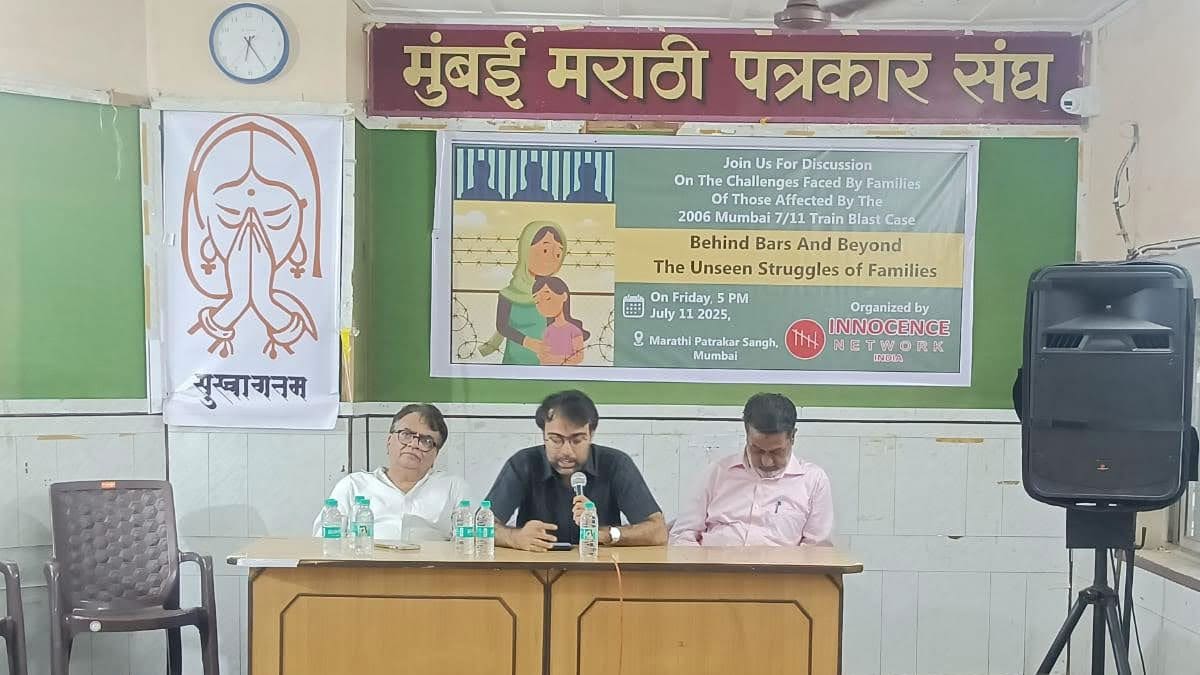
By Osama Rawal
On July 11, the Innocence Network marked the 19th anniversary of the 2006 Mumbai train blasts with its annual programme at the Mumbai Marathi Patrakar Sangh. Titled “Behind Bars and Beyond: The Unseen Struggle of Families,” the programme brought together family members of the men convicted in the case.
While some relatives could not attend in person, they sent letters that were read out by their respective lawyers. The event commemorated not only the 189 people killed in the blasts but also the 13 Muslim men arrested and convicted, whom the organisers insist were wrongfully imprisoned after a flawed and communally biased investigation.
On the evening of July 11, 2006, seven bombs exploded in first-class suburban train compartments within ten minutes, killing 189 people and injuring over 300. Within weeks, the Mumbai ATS arrested 13 Muslim men, alleging links to Jaish-e-Mohammed and the banned Students Islamic Movement of India (SIMI). The prosecution’s case relied heavily on confessions allegedly extracted under torture, many of which were later retracted during the trial. In 2015, a Mumbai sessions court convicted 12 of the accused, sentencing five to death and seven to life imprisonment.
Only Abdul Wahid Shaikh was acquitted, who now leads the Innocence Network, documenting wrongful incarcerations and providing legal guidance in cases involving Muslim youth framed under anti-terror laws. One of the death row convicts died during the COVID-19 pandemic.
At the programme, the families shared the cumulative toll of nearly two decades of incarceration. Most of the men arrested were sole or primary breadwinners. Their families spoke of plunging into poverty, losing jobs, and enduring the persistent stigma that surrounds their lives. Children have grown up fatherless, even though their fathers are alive.
Mubashira Majid, 19, daughter of Mohammed Majid (who is serving a life sentence), wrote that the punishment was “two-dimensional,” explaining that “it is the individual and their family who are punished together.” She recounted how her mother’s health deteriorated—both kidneys failed, and she died while on dialysis—without a final conversation with her husband. “She died waiting,” Mubashira wrote.
She recalled how her childhood was punctuated not by visits to playgrounds, but to courtrooms. “When I was little, I visited my father in court with my nana and nani,” she wrote. Although too young to understand what was happening, her mind was “crowded with questions: Why does Papa stay here? Why doesn’t he come home? Why doesn’t he drop me off at school like other fathers do?” She added that once, while at court, she pretended to stay awake in his lap, afraid that if she fell asleep, “he might leave without saying goodbye.” Mubashira reflected that she now waits only for her father’s return, so that “there can be some closure to our unending grief.”
This story was originally published in maktoobmedia.com. Read the full story here.

